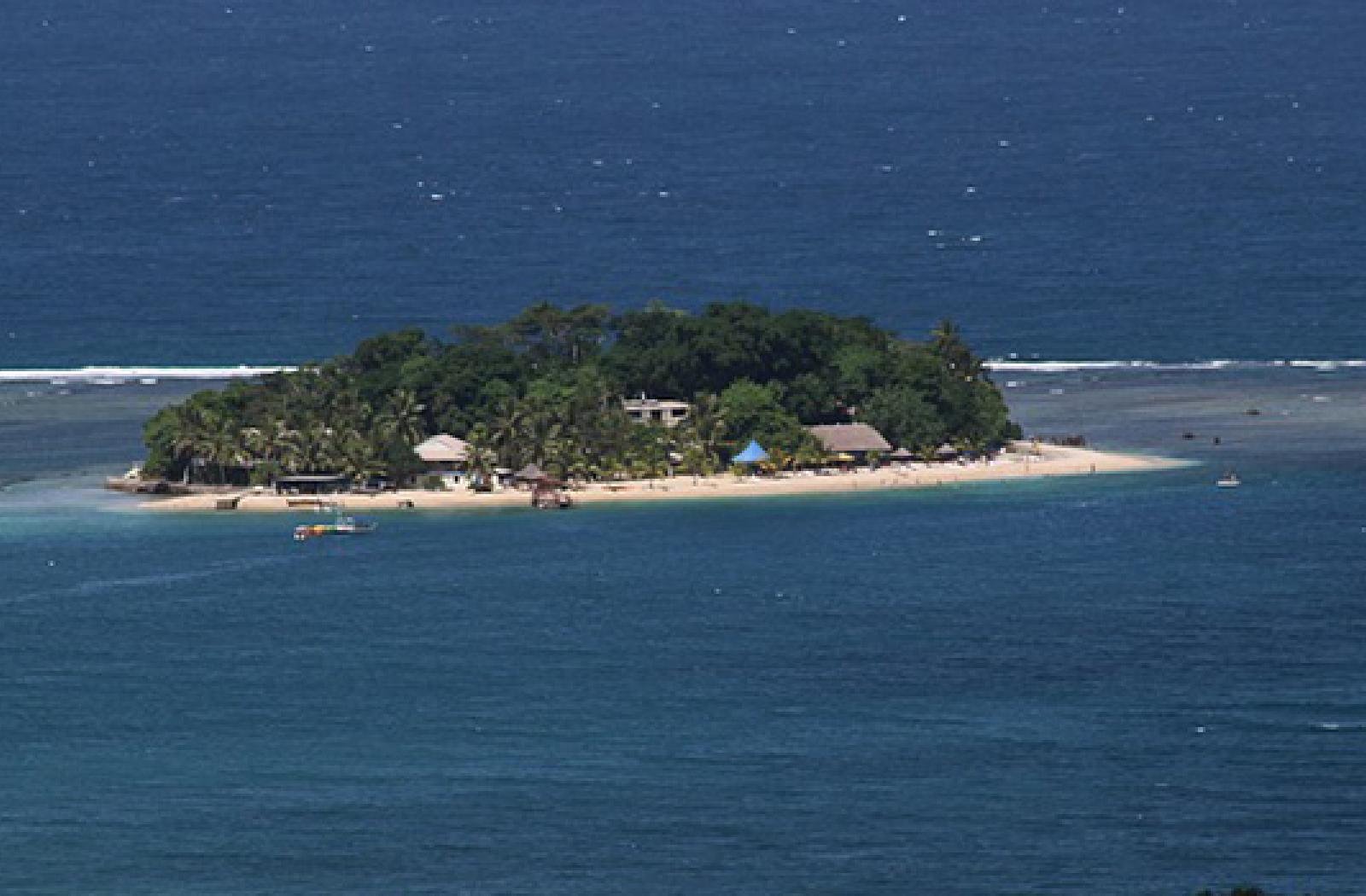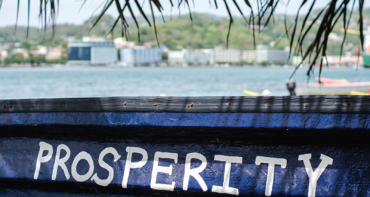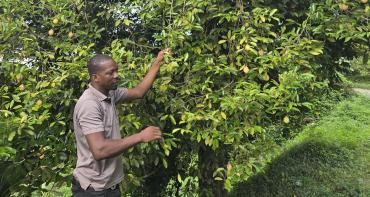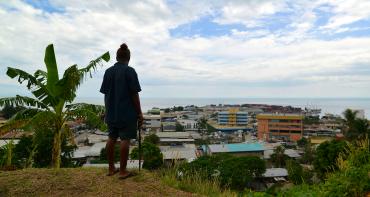In December 2020, Vanuatu graduated from Least Developed Country status, but Vanuatu’s development progress sits on the precipice of exogenous shocks. How will they progress development whilst suffering from repeated climate disasters?

A blog by: Devyn Holliday, Research Officer, Economic,Youth & Sustainable Development Directorate, Commonwealth Secretariat
Though living standards and human capital have improved across the predominantly rural archipelagic nation of over 80 islands since its 1985 induction into the Least Developed Country (LDC) category, Vanuatu remains extremely vulnerable due to high exposure to disasters and low coping capacity.
Ranked as the most hazardous country in the world by the World Risk Index, the country’s prosperous growth is perpetually at risk of being stagnated and even reversed by costly external shocks that are beyond their control, like Cyclone Pam, or 2020’s Cyclone Harold. With an average of two to three natural disasters per year, in a context of increasing frequency and intensity due to climate change, Vanuatu’s development progress sits on the precipice of exogenous shocks.
Where to from LDC Graduation
While Vanuatu’s December 2020 graduation and loss of LDC status affects the nation very little economically in terms of aid and trade, it begs the pertinent question, what lies ahead for Small Island Developing States (SIDS) like Vanuatu (and in three years, Solomon Islands)? How can recently graduated SIDS like Vanuatu achieve the next stage of development when their small economic base is extremely vulnerable to natural hazards and other exogenous shocks?
The Human Assets Index and Gross National Income per capita of a country, which allows SIDS to graduate from LDC status, are consistently stagnated or even decreased by consistent external shocks. There is a need to reevaluate how SIDS with limited resources and high levels of disaster risk are treated when it comes to development support. The vulnerability of development progress for SIDS is very high due to factors largely outside of their GDP which is what is currently used for measuring a nation’s ability to cope with disasters.
Erosion of Human Assets
Natural disasters stress the development of human assets by primarily threatening food and economic security. Nations that are repeatedly exposed to cyclones undergo a cumulative and effectively permanent loss to GDP, with the damage from a single cyclone lasting a minimum of twenty years (UNUEHS, 2020). On a micro level, this damage to GDP weighs the heaviest on Vanuatu’s agricultural sector which makes up 25 per cent of GDP and is predominantly composed of crop production at 79 per cent of the sector production (Ibid). While tourism and international services make up the largest share of GDP earnings, over 80 per cent of Vanuatu’s population relies on agriculture (mainly crops, livestock, and fisheries) for livelihoods and food and nutrition security, and at least 71% of the rural population derives some income from agricultural activities (VNSO, 2013; Government of Vanuatu, 2015).
When cyclones rip through the nation, they not only destabilize the economy but also the ability of the majority rural population to survive. More than half of the 85 per cent of households engaged in subsistence farming have no other source of income (REACH, 2015). The crops and fruit trees lost can take up to a year and a half to replant and bear fruit, and in the case of kava crops, which make up 53 per cent of the nations’ commodities exports, it can take potentially three to five years (Government of Vanuatu, 2015b). While kava can be planted and harvested throughout the year once the plant has matured, its destruction via cyclones leads to issues of social and economic insecurity. For remote communities, many of which lack access to monetary income, cyclones represent a catapult into significant food insecurity leading to increased health and economic problems (Handmer & Nalau, 2019). Ultimately, cyclones destabilize the principal means of making ends meet for the majority of the nation, leading to a butterfly effect on the totality of human assets development in Vanuatu.
Increased Poverty and Inequality
Natural disasters further erode human assets by increasing inequality by destroying education and economic opportunities. Many households use their income from kava production to pay their children’s school fees (Yoshida, 2015), therefore its loss or reduction directly impacts the social and economic mobility of Ni-Vanuatu. Post disasters, children are more likely to withdraw from school to support their family through agricultural or domestic work because of reduced household income to pay for school fees (Government of Vanuatu, 2015). This disproportionately affects girls due to entrenched gender roles, and as a result, increases gender inequality and delays the nation’s economic growth and lowers the average quality of human capital (Klasen, 2000).
In addition to a disruption of education opportunities, youth and the population as a whole are adversely affected by limited employment opportunities exacerbated by natural disasters (UNUEHS, 2020). Micro, Small and Medium Enterprises (MSMEs) in the agriculture sector in particular bear the brunt of natural disasters and climate change risk. This creates crediting risk and inhibits them from borrowing (Reserve Bank of Vanuatu, 2016b). Thus, in the wake of each new disaster, the amount of Ni-Vanuatu businesses able to reopen their doors is less and less, creating protracted unemployment for many.
For all the aforementioned reasons, disaster vulnerability compounded by increasing climate change widens inequality in SIDS like Vanuatu. As poor people often live on “low-value land” where they are more exposed to hazards such as storm surges and high-intensity winds, disasters decrease their quality of life drastically. With fewer assets to fall back on, poor people are forced to adopt coping tactics that have protracted negative impacts such as taking children out of school, selling livestock, and reducing food intake (UNUEHS, 2020). Ultimately, disasters do not just temporarily setback the nation’s poor, but instead, they alter the trajectory of their lives and the trajectory of Vanuatu’s socio-economic development.
Progress against the odds
Despite these challenges, Vanuatu has been able to progress its development to graduate from an LDC - an accomplishment that must be recognized, applauded and supported. However, the international community must work to ensure their progress persists. For Vanuatu to retain and gain socioeconomic development in the face of increasing natural hazards then concerted efforts must be made to bolster the nation’s resilience.
Areas of focus should be:
- Bolstering housing, local, and food infrastructure to ensure human development does not face retrenchment with each disaster
- Generating a more resilient and expansive job market by increasing backwards linkages and resources originating from rural areas for manufactured and service exports. For example, sourcing woods for carvings from rural communities and incorporating rural products into tourism products/experiences as a whole.
- Creating a more inclusive economy by reducing barriers and easing access to capital and credit and improving accessibility to education
- Addressing the systemic barriers hindering the growth of the economy such as the time and procedures required to start a business, the difficulty of dealing with construction permits and cross border trade, and the enforcement of contracts.



